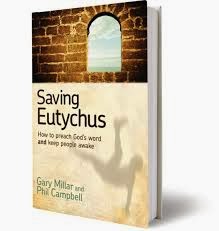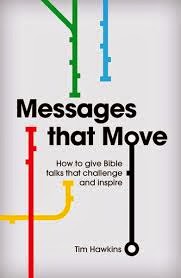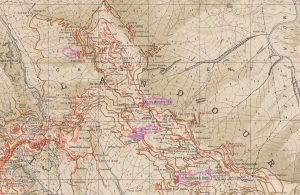Well – here are some ‘high view’ Australians writing books laced with practical advice on contemporary issues and doing so in a creative manner. Neither book is that theological in its focus – and yet it is obvious that thought-full theological minds are behind both books. It is very refreshing.
I have mentioned before (here) Gary Millar & Phil Campbell’s Saving Eutychus, but my copy was on the ocean waters and so I had not finished it. They write with a distinctively energetic and chatty style. The sections I found most helpful are the ones on ‘scripting your sermon’ (43-61); the value of writing your passage out by hand (66); ‘finding a route to the gospel’ from the Old Testament (86-99, possibly the best starting point I have seen on this difficult area); and the idea of a ‘delivery sphere’ as a way of mapping how the voice is doing through the course of a sermon (103-107).
They are strong on the importance of peer critique. To demonstrate this they both provide a sermon manuscript (with some commentary on why they do certain things) and then they critique each other. Again, it is worthwhile to look over their shoulders here. The style they’ve chosen means that they need to keep drawing attention to themselves which becomes a bit tedious – but there is no denying that this is a very useful book, particularly for those taking their early steps into preaching.
The other book is Tim Hawkins’ Messages That Move. I don’t believe I’ve ever met Tim, or that our approaches to training preachers have ever intersected. But again and again, as I read, I couldn’t believe how closely aligned we are. He just expresses it far better than I can! A couple of examples:
(a) I use a model which I call ‘the five corners’ in which I advocate that to prepare an effective sermon we need to start in the world of the text – but then proceed to the worlds of the listener, the wider society and the preacher, doing even more exegesis in each of these ‘corners’- before returning to the text to ensure that it is the final arbiter on the content and purpose of the sermon. Well, Hawkins’ book is as good a resource as I’ve seen on the importance of visiting the listeners’ corner. Illustration. Application. Delivery. Introductions. Conclusions. It is all there. The most useful sections for me were ‘terrible opening lines to avoid’ (97-100); ‘how to tell dynamic stories’ (155-164); the appropriate use of humour (195-212); and ‘how to move away from your notes’ (213-233).
(b) Hawkins is concerned about the static nature of much that passes as expository preaching. So am I. I’ve devised a map metaphor as one way to address this concern (among other concerns). The sermon is like a journey into and through a country, visiting states and cities (etc) along the way. Hawkins likens the preacher to a train driver and the way ‘every great message takes people to a destination’. While ‘the big idea will determine your destination’ (59), I like the way he keeps the focus on the destination. I am looking for a suitable way to introduce ‘destination’ into the map metaphor …
Tim Hawkins has been (pretty much) a career youth pastor. At one point he argues that ‘expository evangelistic preaching to non-Christian high-schoolers week-in-week-out … (has been) the most fruitful preaching we have ever done’ (69). That is a big call. Sure – he will be particularly gifted and that helps. But still it brings to mind all those youth pastors in my preaching classes over the years who would roll their eyes and moan that ‘my young people will never be interested in this stuff’. Now I can make two responses to them: the old one and a new one. The old one? ‘The problem is not so much with your young people – but with you and your feeble and frail convictions about the transforming power of the word of God’. The new one? ‘Go, talk to Tim’.
More personally, it was good for me to absorb these books from out of the more conservative end of the theological spectrum in Australia. It is a context in which I’ve spoken on a number of occasions. I never find it easy. They can be a suspicious and clubby bunch(!), a bit narrowed and known more for what they are agin than what they are for. These books conveyed exactly the opposite impression and I benefited greatly from them.
nice chatting
Paul
About Me

the art of unpacking
After a childhood in India, a theological training in the USA and a pastoral ministry in Southland (New Zealand), I spent twenty years in theological education in New Zealand — first at Laidlaw College and then at Carey Baptist College, where I served as principal. In 2009 I began working with Langham Partnership and since 2013 I have been the Programme Director (Langham Preaching). Through it all I've cherished the experience of the 'gracious hand of God upon me' and I've relished the opportunity to 'unpack', or exegete, all that I encounter in my walk through life with Jesus.
Recent Posts
Football helps me train preachers. See, when you speak to me about football—or, ‘footie’—I need to know where your feet are before I can understand what you mean. Are your feet in Ireland, or Brazil, or the USA, or NZ—or in crazy Australia? It must be the most fanatical sporting nation in the world. Within…
Having been born in 1959, I don’t remember much about the 1960s. But I have heard a lot. Hippies. Drugs. Rock ‘n Roll. Assassinations. Moon-walking. A quick trip across to ChatGPT informs me immediately that it was ‘a transformative decade across the world’—marked by the civil rights and feminist movements, Cold War tensions, consumerism and…









